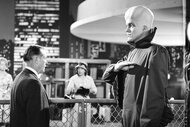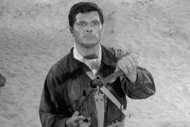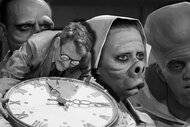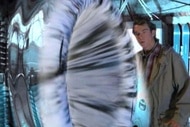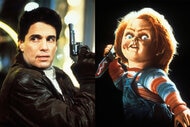Create a free profile to get unlimited access to exclusive videos, sweepstakes, and more!
The many Dale Coopers of Twin Peaks
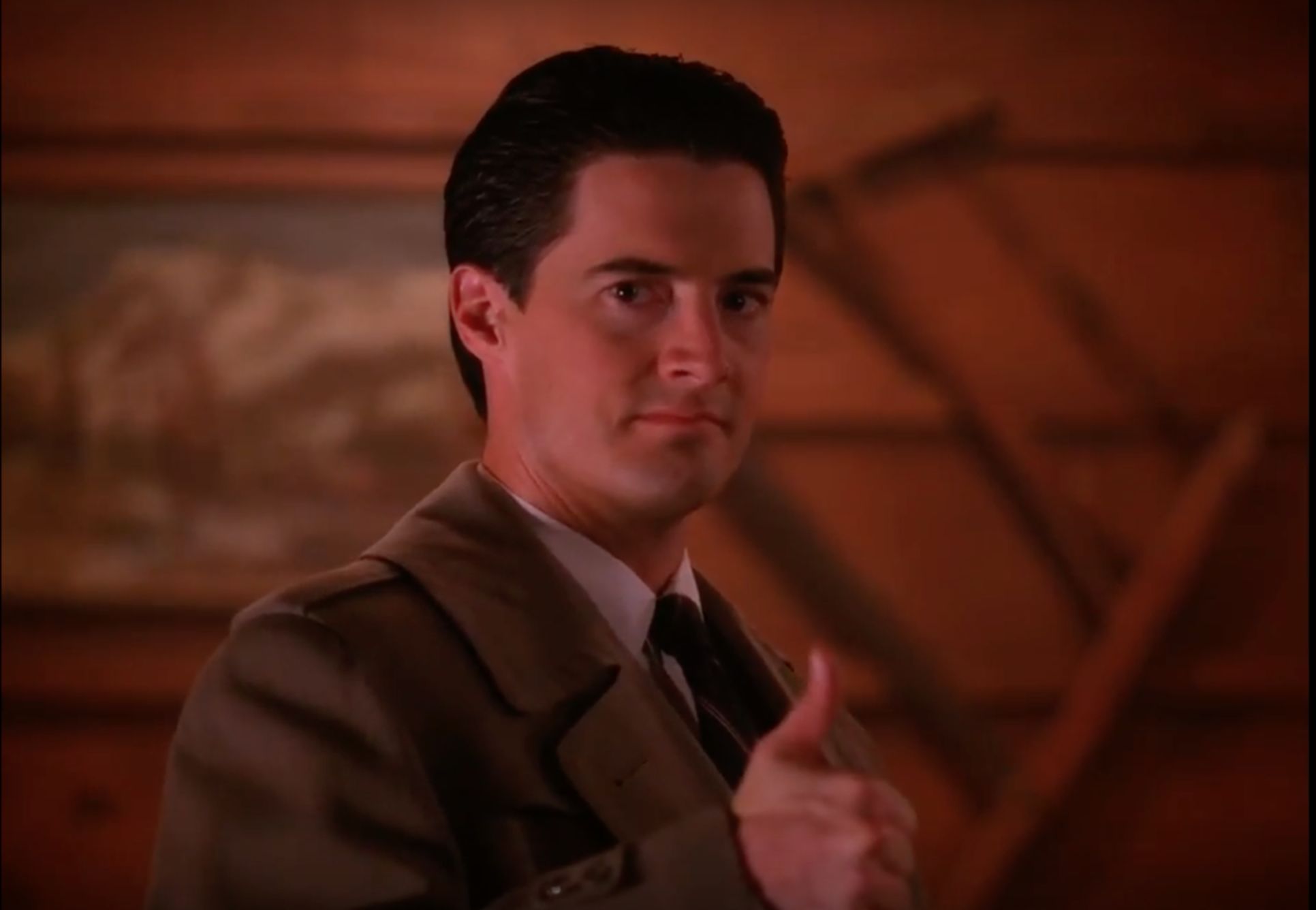
When FBI Special Agent Dale Cooper drives into town, narrating his thoughts on his latest investigation into a tape recorder for his unseen assistant Diane, it feels like someone has turned on the lights in Twin Peaks. A horrific tragedy has struck this entirely too picturesque town, with the beloved prom queen Laura Palmer found murdered and wrapped in plastic. It seems as though this prettily perfect place in Washington state has been irrevocably tainted in a way it can never recover from. Of course, as viewers of Twin Peaks are keenly aware, the stain was always there, the overwhelming rot of this town always beneath its pristine surface. Still, for a brief moment, when Dale Cooper arrived with a spring in his step, we all thought that maybe, just maybe, everything would work out all right in the end.
Director David Lynch may be best known for his nightmare-inducing surrealism — from the wailing alien-like baby in Eraserhead to the hag behind the dumpster in Mulholland Drive — but he’s also a filmmaker and artist with a true love of old-school Americana. As keen as he is to expose the darkness brewing behind the façade of white picket fences and apple pie, he also legitimately loves that iconography. Oft overlooked regarding Lynch’s work is how it is heavily defined by complete and utter earnestness. He’s a Boy Scout at heart, and nowhere are these two qualities better exemplified in his work than through Dale Cooper, played to perfection by the wonderful Kyle MacLachlan.
Dale Cooper was created to be too good to be true. He arrives in Twin Peaks with utmost dedication to his job and the seriousness it entails, but he was also the beacon of hope that the residents and viewers desperately needed. Even as the twisted corruption of Twin Peaks is revealed through the Laura Palmer murder investigation, Dale remains unimpeachable. He is never swayed to do evil, he has no tragic backstory, and he is never broken down or cynical about his job. If Twin Peaks the town represents the disintegration of the baby boomer Americana ideal, then Dale Cooper is the untainted hero straight out of a Norman Rockwell painting who we prefer to reality.
Of course, not even Dale Cooper gets to leave Twin Peaks intact. Indeed, as shown in the second season’s iconic finale, which kicked off a 25-year break before The Return, he becomes trapped in the black and white lodge while his body is possessed by the devious force of Killer Bob. That final shot of Dale, with pitch-black eyes and blood running down his face as he cackles maniacally at the stunned audience, promised nothing but pain for Dale. Or, to put it more accurately, this version of Dale.
In Twin Peaks: The Return, the show’s long-running theme of duality comes to the forefront. Before that, we saw a curious "What If" scenario in Twin Peaks: Fire Walk With Me, the prequel-slash-alternate-universe movie version of the story that opens with two FBI agents being sent to the town of Deer Meadow to investigate the murder of Teresa Banks, who is referenced in the show. This town is no Twin Peaks: The local authorities are distrustful of the new arrivals, the quaint diner serves bad food and is full of belligerent staff, and nobody really seems to care about the death of a teenage girl. It is the version of Twin Peaks closer to reality than the quirky postcard joys of our favorite Washington logging town. Dale does feature briefly in the movie, but his FBI counterparts, played by Kiefer Sutherland and Chris Isaak, are more notable representations of what a more realistic Agent Cooper would be like: jaded, tired, and over being a hero.
By the time we are finally reunited with Cooper in The Return, he has splintered into multiple individuals, some he is aware of and others he is not. The Dale, our Dale, is stuck in the Lodge, unable to do anything of use and overwhelmed by the guilt of that which he cannot control or fix going on in the outside world. In his place is "evil Dale," a greasy-haired, leather-jacket-wearing sleazeball who represents undiluted human amorality. He steals, he abuses, he frequently attacks and rapes women, and he has no qualms about destroying anyone and anything in his way. Everything about him radiates unnerving malice, much in the same way that Dale Cooper practically beams joy and sunlight. It’s often hard to believe that both Dales are played by the same man.
And then there is Dougie Jones. Bless the pure, simple, and utterly useless heart of Dougie. When Dale finally makes his way out of the lodge, he is transported into the body of a Las Vegas businessman, also played by MacLachlan. For the vast majority of The Return’s 18-episode run, Dougie is essentially catatonic, unable to do much for himself beyond getting excited over coffee and doodling surprisingly helpful notes. His beleaguered wife, played brilliantly by Naomi Watts, has to drag him everywhere, while his colleagues and bosses and the occasional hitman out to get him seem utterly oblivious to his sudden inability to, you know, talk or work or communicate. Dougie, however, seems to be blessed by pure luck. He wins a fortune at a local casino, he uncovers mass corruption at his workplace, and he constantly avoids death at every turn. Everything works out well for Dougie! If Dale is the epitome of the dream American man — hard-working, vigilant, passionate, dedicated — then Dougie is more the representation of white male mediocrity in action. Of course he succeeds. He cannot possibly fail! It’s the perfect way for Dale to get back on his feet before he needs to save the world.
After Dale seemingly saves the day and gets the beautiful welcome back to Twin Peaks he's dreamed of for 25 years, he and Diane (Laura Dern) leave and pass through some sort of portal that takes them to a motel. The next morning, Diane is gone and Dale finds a letter from a woman named Linda, addressing a man named Richard. Linda says that she has left and that Richard should not look for her. Dale tries to look for Laura Palmer again and finds a woman who looks exactly like her but claims to be named Carrie Page. When they head to Twin Peaks, something has changed. The Palmer home belongs to someone else who has never heard of Sarah. Yet Laura's mother can be heard calling her name. Dale asks out loud, "What year is this?" With a scream, the show ends. Is this Dale and Laura or Richard and Carrie? Does it even matter?
In a previous piece for SYFY FANGRRLS, I wrote about how Laura Palmer represents the great American martyr of genre fiction. She was “sacrificed” to make way for Twin Peaks, but David Lynch could never entirely let her go, and The Return feels like his futile attempt to bring her back in some way. Laura, however, cannot be resurrected. She has to die. Dale Cooper, therefore, has to fail in being the perfect hero.
The perfect hero of Dale Cooper does not exist without the various facets of his personality: the uncontrolled id who wreaks havoc with joy, the apathetic working man with no concern for heroics, the exemplification of white male privilege and authority, and the lost man whose obsession with saving the day has turned him into a whole other person devoid of personality beyond his own savior complex. We want Dale to succeed. We like him too much to want to see him fail, but even the most idealized fantasies cannot be sustained through pure desire alone. No matter how many times David Lynch tried, he couldn’t bring Laura Palmer back, and Dale Cooper will forever remain trapped in the same cycle.
In a world where sex crimes and violence against women, particularly those engaged in sex work, are oft ignored or dismissed by the authorities, the true cruelty of Laura’s fate is dishearteningly more representative of reality than the shining light of the one handsome man dedicated to truth, justice, and the American way.





